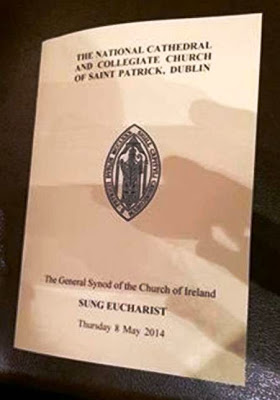Students and ordinands from the Church of Ireland Theological Institute at last night’s Synod Eucharist in Saint Patrick’s Cathedral, Dublin
Patrick Comerford
This afternoon at General Synod we debated whether we should continue meeting every second year in Christ Church Cathedral, Dublin.
It looks like the arrangement is coming to an end after the synod passed a private member’s motion moved by Mrs Joan Bruton of the Diocese of Meath and Kildare. The resolution acknowledges the “assistance of the Dean, Chapter and Staff of Christ Church Cathedral,” but proposed that “the General Synod should be located in the City of Armagh subject to contractual agreement until another venue.”
As Archbishop Richard Clarke pointed out, the synod will meet in Armagh next year anyway [2015]. But where are we going to meet in 2016?
Thisafternoon, during bthe debate on the report of the Council for Mission, I spoke about the work of Us, the Anglican mission agency which began as the Society for the Propagation of the Gospel, and later became USPG. This year, Us is celebrating the 300th anniversary of its foundation in Ireland in 1714, with tercentenary services in Saint Macartin’s Cathedral, Enniskillen, and Saint Patrick’s Cathedral, Dublin.
One of the pleasures I have had at General Synod for many years now is acting as one of the Church of Ireland hosts to our ecumenical guests.
This year, the Church of England is represented by the Bishop of Brixworth, the Right Revd John Holbrook, who has been a Suffragan Bishop in the Diocese of Peterborough since 2011.
The other guests include: the Revd Lorraine Kennedy Ritchie, Irish Council of Churches; .Mrs Eilis O’Malley and Father Liam Ó Cúiv, the Roman Catholic Church; the Very Revd Dr Roy Patton and Mrs Cherry Poynton, the Presbyterian Church in Ireland; the Revd Dr Heather Morris and Ms Gillian Kingston, the Methodist Church on Ireland; the Revd Dr Heinz Lederleitner of the Old Catholic Churches; and the Revd Sarah Groves, the Moravian Church.
Bishop Pat Storey chairs a session of the General Syod this morning
It has been interesting to observe their positive reactions when Bishop Pat Storey chaired one session of the General Synod this morning, and to her place in the procession in Saint Patrick’s Cathedral, Dublin, last night, when she took her place as the senior bishop of the Church of Ireland, immediately before the two archbishops.
We have had meals and coffee breaks together, we have had very open discussions about the opportunities and problems our traditions face in ministry and mission, and we attended the Synod Eucharist in Saint Patrick’s Cathedral last night [8 May 2014].
Last night the chapter of Christ Church Cathedral was invited to robe and process with the chapter of Saint Patrick’s Cathedral for the Synod Eucharist, and students and ordinands from the Church of Ireland Theological Institute also took part in the service. This afternoon, in Christ Church Cathedral, the general synod debated the report of the Commission for Christian Unity and Dialogue, which included a report on the progress we are making in dialogue between the Church of Ireland and the Moravian Church.
It was a particular pleasure to be sitting in the front rows this afternoon with Sarah Groves when we heard about this dialogue and yesterday with Heather Morris and Gillian Kingston when the Bill providing for the inter-changeability of ministry between the Church of Ireland and the Methodist Church in Ireland passed its first and second stages.
The Bill, in the name of the Very Revd Nigel Dunne and Bishop Michael Burrows of Cashel, Ferns and Ossory, builds on the 2002 Covenant between the Church of Ireland and the Methodist Church in Ireland which looks forward to a time when the ministries of both Churches could be fully inter-changeable and both churches could be visibly united.
The Bill reaches its third and final stage tomorrow morning. If it is enacted then, it permits inter-changeability of ministry although it makes clear that a Methodist presbyter is not a de facto Church of Ireland priest or vice versa. But the Bill permits Methodist ministers to be considered for and appointed to a cure or similar role within the Church of Ireland, and Episcopal Ministers – presidents and former presidents of the Methodist Church – to be considered for episcopal election in the Church of Ireland without further consecration.
Dean Dunne pointed out that both churches will continue to operate their own systems of government, organisation and ministry, and the three-fold order of bishop, priest, and deacon remains fundamental to the ordained ministry of the Church of Ireland.
This Bill has comes at the end of many years of dialogue, with substantial endorsement of each stage of the discussions on inter-changeability by the General Synod at each crucial juncture.
The Bill receives its third reading tomorrow morning.




No comments:
Post a Comment